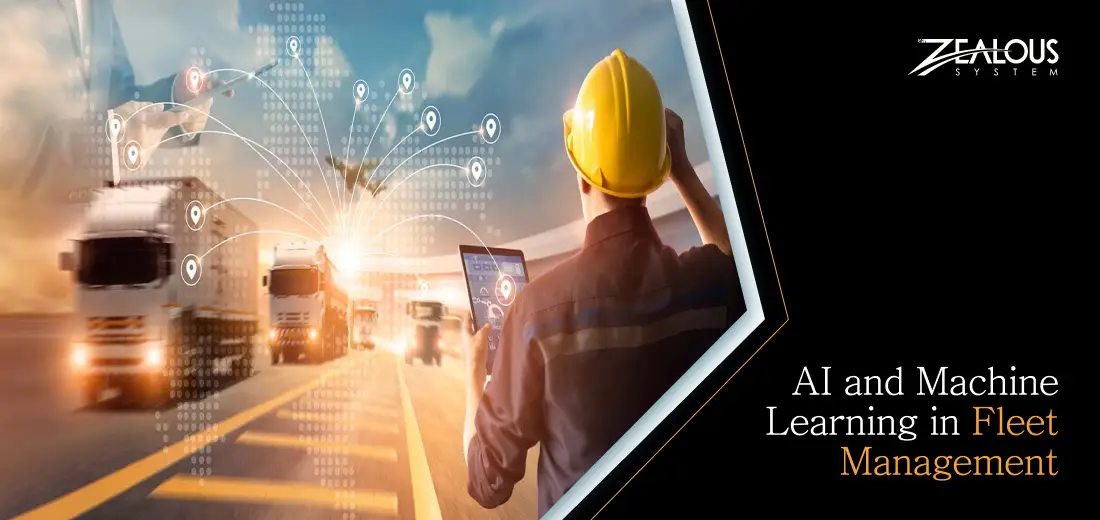


Fleet management is essential for industries that depend on transportation and logistics. Managing vehicles, drivers, and routes efficiently can greatly affect a company’s profits. With the introduction of AI (Artificial Intelligence) and Machine Learning (ML), fleet management is experiencing a major change.
Artificial intelligence (AI) and machine learning (ML) are changing how companies manage their vehicle fleets. It is like having a fleet manager who does not sleep, eat or rest, but continuously optimizes your operations 24/7.
By crunching big data, these technologies can boost efficiency, make operations safer, cut expenses, and support eco-friendly practices. They’re opening new doors for smarter fleet management and a greener future.
According to Bloomberg, by 2032, the generative AI market could hit $1.3 trillion. If you are among those who get on board the recent developments, then Zealous System is here to help you out. Connect with us if you need AI software development services or Generative AI services for your fleet management business optimization. We also provide generative AI consulting, generative AI model development and generative AI integration.
Let us begin by understanding Fleet Management.
Simply put, fleet management includes managing and coordinating a group of vehicles (or fleet) owned or operated by a company or organization. It includes tasks like vehicle maintenance, tracking their location, managing fuel usage, scheduling repairs, and ensuring compliance with regulations. The goal is to improve fleet operations’ efficiency, safety, and cost-effectiveness.
Let’s now find out what role AI and ML play in Fleet Management.
In managing vehicle fleets, AI uses advanced algorithms to mimic human thinking and make decisions. It acts like a smart assistant, capable of handling tasks autonomously. Meanwhile, ML, a subset of AI, is a specific ability of this assistant. It learns from data, recognizing patterns from past information to predict future outcomes. Together, they create a powerful toolset for improving fleet operations and efficiency.
Artificial intelligence in fleet management systems includes using specialized algorithms and techniques that allow machines or software to imitate human intelligence and perform tasks that require human help or decision-making. AI technologies in fleet management help us understand complex data, learn from patterns and trends, make decisions, and improve efficiency of the operations.
Machine learning in fleet management systems involves using algorithms and models that can learn from data and make decisions without the need to be specifically told what to do. These programs study all the historical and current data from different parts of fleet management to find patterns, understand things better, and predict what might happen next.
Now that we know how AI and ML are game-changers when it comes to fleet management, Let’s find out why you should invest in AI and ML.

This has proven beneficial in improving operational efficiency, cost, savings and safety. Let us explore the many benefits of implementing AI and ML into your Fleet Management Strategies:
A major benefit of AL and ML in Fleet management is that they use advanced computer programs to study large amounts of data from GPS trackers, traffic updates, and historical driving patterns. This analysis helps AI systems suggest the best routes for vehicles, considering factors like traffic conditions, weather and fuel efficiency. ML, a subset of AI, continuously learns from new data to improve route predictions over time, ensuring vehicles reach their destinations faster and more efficiently.
AI makes vehicle tracking more effective by making quick decisions as things happen. It uses information from GPS and sensors right away to change routes based on traffic or if roads close unexpectedly. This helps vehicles avoid delays and arrive on schedule. Overall, AI and ML are revolutionizing vehicle tracking and routing by making operations smarter, safer, and more cost-effective.
Predictive maintenance is a way to predict when something might break down before it actually happens. In fleet management business, AI and ML can analyze data from vehicles—like how they’re running and how many miles they’ve driven—to figure out when parts might need fixing or replacing.
By doing this, fleet managers can schedule maintenance at the right times, avoiding unexpected breakdowns that could stop vehicles from working and causing delays. This helps keep the fleet running smoothly and reduces the amount of time vehicles are out of service, which saves money and keeps customers happy.
Using ML and AI benefits fleet managers by analyzing driver’s behaviour —like how fast they go or how they stop—to see if they’re being safe. They can then use this info to train drivers better or give rewards for good driving. This not only makes accidents less likely but also helps save on gas and insurance.
As mentioned before, AI can figure out when vehicles might break down and get them fixed before they do. This keeps drivers safe and makes sure vehicles stay on the road longer. Overall, using these technologies helps fleet managers keep drivers safe, save money, and make sure everything runs smoothly.
ML and AI won’t just help manage fleets—they’ll also improve the all types of supply chain. They’ll work with systems that track what’s in stock, predict how much customers will want, and manage information from suppliers. These algorithms will make sure there’s enough of everything in stock, make shipping smoother, and make sure orders get to customers faster. This makes everything work better and saves money.
Another benefit of ML and AI is that fleet managers use the data generated to save fuel and cut down emissions. They look at how fast vehicles go, how long they sit with engines on, and how engines work. This helps managers find ways to use less fuel and pollute less.
AI systems can also tell drivers how to drive to save fuel while they’re driving. This saves money and helps the environment. Using data like this helps managers plan the best routes for vehicles to use the least fuel possible. Overall, using these latest fleet management technologies helps managers save money and make operations better for the environment.
It is beneficial to integrate AI and ML with Telematics and IoT as ML and AI can team up with telematics systems and IoT devices to gather and study a lot of data from vehicles, roads, and other places. This helps fleet managers see the big picture and use facts to make decisions. They can use AI to make operations smoother and do things better over time. This setup lets managers keep improving how they run fleets and make smart choices based on what they learn from all the data.
AI can optimize routes for fleet vehicles, cutting down on maintenance costs. These innovations are changing transportation businesses, improving how fleets are managed and improving efficiency. The impact of IoT on fleet management is transformative if you wish to streamline your operations, receive real-time insights, and improve the safety and efficiency of the vehicles.
ML and AI can look at past data about how much stuff needs delivering, how many customers want it, and how much vehicles can carry. This helps fleet managers use trucks better by putting the right ones on the road for each job. It means that trucks carry more, use less gas, and drive fewer empty miles. This also helps lessen traffic and is better for the environment.
ML and AI analyze past data on delivery needs, customer demand, and vehicle capacity to help fleet managers use trucks more efficiently. They match the right trucks to each job, so trucks carry more, use less fuel, and drive fewer empty miles. This reduces traffic and is better for the environment overall.
Looking ahead, artificial intelligence solutions and machine learning solutions will play an even bigger role in fleet management software development services to improve fleet operation and efficacy. They’ll predict when vehicles need maintenance and find the best routes to save time and fuel. They’ll also make sure driving is safer and help managers make better choices. AI isn’t just changing how fleets work—it’s setting new standards for what is next to come.
Recent requirements of the industry show that a shift to Generative AI is the way ahead. Generative AI uses models that capture the significance of data, offering insights in a way that people can easily understand. It improves fleet systems by adding context and tailoring information. With generative AI, raw data turns into customized insights, allowing managers to make fast, informed choices. It speeds up the process from collecting data to making decisions, making operations more efficient.
If you are looking for an AI software partner to help bring your ideas to life, then contact us now!
Our team is always eager to know what you are looking for. Drop them a Hi!
Comments